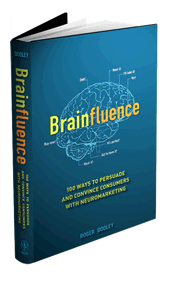Oct 30, 2017
You will find this podcast full of great ideas about how to manage, market and make your business soar, all with the brain in mind. Our guest is Roger Dooley, the author of Brainfluence: 100 Ways to Persuade and Convince Consumers with Neuromarketing. He also writes his popular blog Neuromarketing.
Roger has held senior positions at several large companies but is really an entrepreneur and has been for decades. In his interview and in much of his writing, he bridges the gap between academics doing valuable research and business people who need practical, easy-to-implement ideas. We get that, don’t we!
 What is
Brainfluence? Roger has compiled 100 simple,
actionable techniques to build your brand, win new
customers, and close more sales. We talk about his
wonderful mix of the all-time best ideas from his AdAge Power150
blog Neuromarketing and
brand new material.
What is
Brainfluence? Roger has compiled 100 simple,
actionable techniques to build your brand, win new
customers, and close more sales. We talk about his
wonderful mix of the all-time best ideas from his AdAge Power150
blog Neuromarketing and
brand new material.
Every one of the methods is based on serious brain research. But you will find each concept presented in a manner that is totally practical and free from scientific jargon.
He is the founder of Dooley Direct, a marketing consultancy, and co-founded College Confidential, the leading college-bound website. That business was acquired by Hobsons, a unit of UK-based DMGT, where Dooley served as VP Digital Marketing and continues in a consulting role.
In this episode, we will be discussing:
- Neuromarketing, the bridge between marketing and brain science
- Non-conscious techniques through big name companies such as Amazon
- Different social and habitual elements that contribute to decision making
- Implementing minor behavior change to help change overall strategies
- Motivation, ability, and friction as leverages
- Utilizing non-conscious arguments to create better marketing strategies
- Making non-desirable habits less effortless by minimizing friction
- The importance of consistency and ease in creating an effortless user experience
- Eliminating complexity to make it simpler to be successful
- Human adaptation to complexity and faster times
Resources Mentioned in This Episode:
